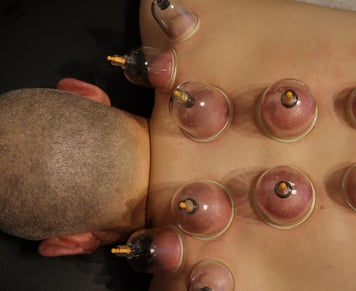Cupping Therapy
Cupping therapy is an alternative therapy that involves placing cups on the skin to create suction. These cups can be made of glass, silicone, or plastic. The suction creates a vacuum effect, drawing the skin and underlying tissues into the cup. Cupping therapy is often used in conjunction with massage or as a standalone treatment.
Here are some key benefits associated with cupping therapy:
1. Pain relief: Cupping therapy is known to help alleviate muscle and joint pain. The suction created by the cups promotes increased blood flow to the area, which can reduce inflammation and relieve pain.
2. Improved blood circulation: The suction from cupping therapy can stimulate blood flow to the treated area. This increased circulation can help deliver oxygen and nutrients to the tissues, promoting healing and improving overall health.
3. Relaxation and stress reduction: Cupping therapy is often found to be relaxing and can help reduce stress and anxiety. The gentle pulling sensation of the cups on the skin can induce a calming effect.
4. Muscle relaxation: Cupping therapy can help relax tense muscles by loosening fascia and promoting better blood flow. It is commonly used to address muscle stiffness, knots, and spasms.
5. Detoxification: Cupping therapy is believed to help in the removal of toxins and waste products from the body. The suction from the cups is thought to draw out impurities through the skin, promoting detoxification.
6. Improved range of motion: By releasing tight muscles and fascia, cupping therapy can enhance flexibility and range of motion. It is often used by athletes to help improve performance and prevent injuries.
7. Enhanced healing and recovery: Cupping therapy is known to promote tissue repair and accelerate the healing process. It can be beneficial for injuries, such as sprains or strains, by reducing swelling and promoting circulation to the affected area.
While cupping therapy has been used for centuries and is generally considered safe, it may cause temporary skin discoloration, bruising, or mild discomfort. It is not recommended for individuals with certain medical conditions, such as deep vein thrombosis or skin conditions like eczema or psoriasis. If you're considering cupping therapy, you should consult with us so we can assess your individual needs and provide appropriate treatment.


